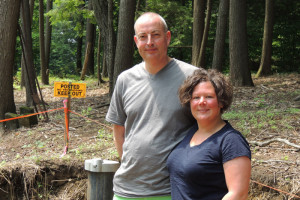By Gordon Woodworth, Chronicle News Editor
A Ballston Spa couple appears to have won its three-year fight to build a 3,200-square-foot home on a landlocked, hillside double lot at Assembly Point on Lake George.
The Appellate Division of State Supreme Court, Third Judicial Department, ruled unanimously — by a 4-0 vote — on March 12 that the Queensbury Zoning Board of Appeals was “rational and not arbitrary” in having granted area variances for Steven and Jennifer Kitchen’s summer home.
John Wright of Bartlett, Pontiff, Stewart & Rhodes, an attorney for the Kitchens who argued the case, said the unanimous ruling “means the appellants would need to seek special permission to file an appeal with the Court of Appeals.”
Attorney Jon Lapper, who represented the Kitchens in the planning process, said simply, “It’s over.”
But attorney Arkley L. Mastro, Jr., who represents neighbors including Albany Times-Union publisher George Hearst fighting the Kitchens’ plans, cites “another level of appeal available by permission.

He told The Chronicle, “I haven’t had the opportunity to review the case with my clients yet…but this case could have implications throughout the state, and it could be the type of case that warrants a hearing by the Court of Appeals.”
Mr. Mastro termed the variances granted by the Zoning Board of Appeals “extraordinary, and beyond the scope of what the ZBA does.”
Kitchens: ‘Never give in to bullying’
Contacted for comment via email, the Kitchens said they are scheduling contractors “and will start work in the coming weeks.
“To have a home at Lake George is ‘our American dream’…This adversity brought the community together instead of pulling it apart. Ironically it strengthened existing relationships and it opened up opportunities to welcome new people and relationships to an otherwise exclusive community.”
Asked what lessons they have learned, they said, “Never give in to bullying. Always conduct yourself with integrity, class, and kindness — these are free. You can’t do it alone, you need the help and support from others and be grateful.”
The Kitchens said after the decision, “several neighbors have named our property ‘Victory Point’ and had a sign made for us. It was a wonderfully unexpected and thoughtful surprise, and the ‘Victory Point’ sign will be proudly displayed when our home is completed.”
A year ago neighbor Phil Morse — the Glens Falls medical device pioneer and now co-owner of the Boston Red Sox — wrote a letter to the editor published in The Chronicle strongly supporting the Kitchens and saying the people fighting their plan “should be ashamed.”
Opponents included George R. Hearst III, publisher of the Albany Times Union, whose property adjoins the Kitchens’.
He and fellow neighbors Evelyn Jaeger, Shirley Mockel and Evelyn Mockel, plus engineer Dave Klein, appealed a Jan. 2, 2014, ruling by State Supreme Court Judge Robert Muller that dismissed two zoning challenges to the Kitchens’ plans.
The dispute was the subject of a front-page story in The Chronicle in 2013.
The FUND for Lake George and its Lake George “Waterkeeper” participated in the initial challenge to the Kitchens’ home, but were not parties to this appeal.
Lapper: Foes used lawsuit as ‘sword’
The Appellate Division upheld actions by Queensbury town officials as well as Supreme Court Judge Muller’s ruling.
Kitchens attorney Mr. Lapper said, “This was a case where an Article 78 lawsuit was used as a sword and not a shield, but it all worked out. Certainly a lot of people did everything right. This is a great result.”
Mr. Lapper said “the Zoning Board of Appeals did a very thorough job…They required the Kitchens to modify their plans to give the minimum relief possible.
“The Kitchens have state-of-the-art stormwater mitigation planned, while the neighbors who complained have no stormwater mitigation at all. There is some hypocrisy there with the neighbors complaining.”

The Appellate Division said Mr. Klein and his firm “did not exhibit any specialized harm and do not own property near the Kitchens’ property. Thus, Klein does not have standing in his individual capacity or as an agent for his firm.”
The judges said “the ZBA did not err in finding that Klein was not a duly authorized agent of an aggrieved party…and was not himself aggrieved, so he had no standing.”
The decision said “the ZBA acknowledged the potential problems from clearing so much vegetation from the property, but were impressed by the Kitchens’ extensive efforts to mitigate the impact by including stormwater mitigation measures that do not exist on other neighboring properties.”
Copyright © 2015 Lone Oak Publishing Co., Inc. All Rights Reserved.
 Glens Falls Chronicle Serving the Glens Falls/Lake George region; Warren, Washington and northern Saratoga counties since 1980
Glens Falls Chronicle Serving the Glens Falls/Lake George region; Warren, Washington and northern Saratoga counties since 1980

